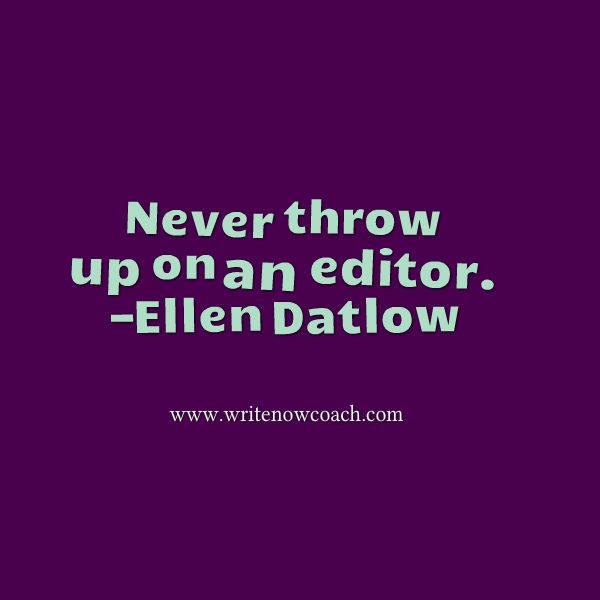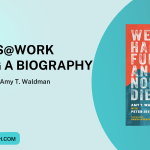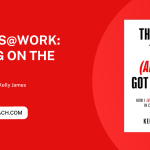Success Secrets Editors Wish You Knew by Rochelle Melander
March 22, 2016
Note From Rochelle
Dear Writers,
It’s been that kind of a week: everyone has had some version of the creeping crud, including me; the sewer backed up into the basement; and my inner critic seems to be especially disparaging. In spite of these challenges, I’m working on the second draft of my novel. I’m not revising as quickly as I’d like to, but I’m determined to keep moving forward. I’ve stuck to my schedule because I have a beta reader and an editor lined up to read it when it’s done. Just knowing I have a tiny audience helps me stick with it.
Today’s tip talks about how to work with an editor. As an experienced editor and writer, I know what it’s like to be on both sides of the editing experience. If you’re struggling to finish or sell a book and need the eyes of an experienced editor and coach, contact me for a complimentary consultation.
Happy Writing!
Rochelle, the Write Now! Coach

Success Secrets Editors Wish You Knew
By Rochelle Melander
So you’ve taken the big leap of hiring an editor. Now how do you make the relationship work?
I’ve edited a quarterly periodical for 15 years. In addition, I edit books for both publishing houses and private clients. I’ve also worked with many editors on my own books and articles. Over the years, I’ve kept a mental list of things that have helped me succeed as both a writer and editor. Here are just a few of the items on my list. Follow them, and you’ll be a more successful professional writer. (Honest!)
Editors Want the Best for You
When we open your manuscript, we hope it will be great or, at least, your very best work. If it isn’t, we’ll help you create your best work. We want your book to be great! But we need your cooperation. Be open to revising your manuscript. (I know! It’s hard.) Listen to our suggestions for how you can revise elements of your work. If you do not understand the proposed changes, ask questions (see #3 below for more on this).
Pro tip: Let go of your ego. Your editor is not here to tell you that you’re a rock star who writes like the magic combination of Shakespeare and Charlotte Bronte! Let your ego take a vacation with a good book and a bottle of wine while you work with the editor on making your prose sing.
It’s Not about You
When editors offer suggestions for improvement, remember it’s about the work—the book, short story, novel, article, or poem—it’s not about you. I know—it’s hard to hear someone criticize your baby and not take it personally. But that’s all a part of becoming a successful professional writer. In the end, the writer has to leave the reader alone with the baby. The work has to stand on its own.
We Like it When You Ask Questions
It may take time to learn how best to communicate with your editor. As you work to understand each other, ask questions.
*At the beginning of the editing relationship, ask the editor how they work with writers. Do they offer several rounds of edits or just one? Do they use track changes or another method of suggesting edits? Do they budget time to talk through the suggested changes with you?
*Whether you’ve hired your editor or been assigned one from the publishing house, deadlines matter. If you’ve hired an editor, ask him to estimate when he’ll be done with your book. If you’ve been assigned an editor from the publishing house, she will probably provide a schedule of deadlines for you. If not, ask for one.
*If you don’t understand your editor’s requests, ask him to clarify statements, queries, and changes.
Guidelines Matter
Publishing houses or periodicals create writer’s guidelines for a reason, and it usually has to do with two things: audience and money. The style guidelines are designed to help the writer reach the intended audience (Remember #2: it’s not about you).
If writers don’t stick to the style guidelines, it adds more work for the editor—who has to edit the work to fit house style. The format guidelines, including word count, often have to do with money. The publishing company has budgeted for a certain number of pages. When writers turn in work that is too long or too short, we have to fix it.
Deadlines Matter
Think of your writing deadline as just one domino in a long line of dominoes. When one deadline is missed, it affects every other deadline for the project. Yes, there’s sometimes wiggle room, so if an emergency arises, please do talk to your editor about an extension. That said, I would not encourage any writer (no matter how good you are) to miss a deadline more than once.
Bonus Tips
Say thank you! Editing can be a challenging task. The editor is working hard to make your book shine. Yes, the editor will get paid—either by you or the publishing house. But beyond that, the only credit the editor will receive is a note from you on the acknowledgment page. Let the editor know that you’re grateful to them for helping you improve your book! (Pro tip: Send chocolate. Refer your friends. What editor doesn’t like a bar of good chocolate? Nothing says thank you like a small gift and a referral to all of your writerly friends!)

A Final Word
I could go on and on. Get a few of us editors talking at a writing conference, and you’ll hear the wisdom pour out of us: Do your homework: don’t submit your thesis on biodiversity in the Wisconsin prairie to a theology journal, even if the journal is interested in all things “green.” Read voraciously in your field and as much outside your field as you can. Avoid jargon. Use spell check. Keep a list of your own personal grammar goofs and use it to check every piece before you turn it in. Finally, once you think your piece is done, it probably needs a bit more work.















Excellent info, Rochelle! I’m now on the “other side” with a job I have editing progressive church worship resources. A point I’ve learned rather quickly is it’s good to build the wiggle room into the deadline issue. However, I’m thinking if the writers know that it’s there, many of them will assume that the wiggle room is the “real” deadline! Personally, I’m draconian with my own writing deadlines, because I don’t like the feeling that I’m making some editor’s life miserable. I’d be interested in hearing your thoughts with how to communicate (and encourage) to writers that deadlines are real without ostracizing or making them feel bad.
Thanks, Daniel! Like you, I’ve learned to build more time into writing deadlines. I also edit ahead so that I’ll have time to deal with writers who are late with their work. One of my editors gave me what I would call “mile marker” deadlines with one of my books. And though I didn’t look at her feedback along the way, it did help to have those scheduled times to turn in work. That has worked with some of my writers–giving them a first look deadline. What’s worked for you?